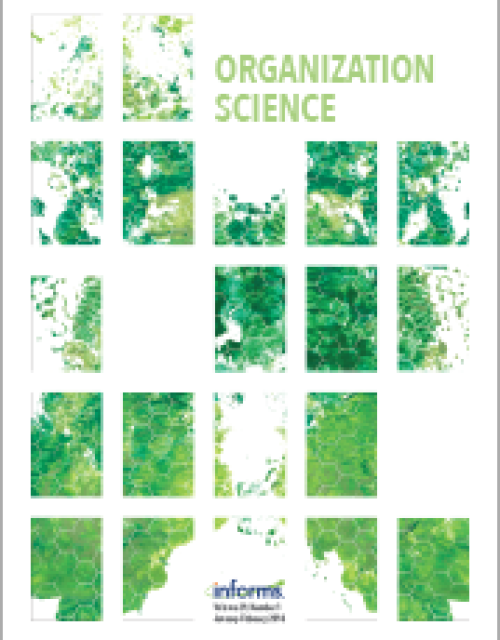Publication records
Subject(s)
Information technology and systems; Unspecified
Keyword(s)
misinformation, disinformation, fake news, user intervention, countermeasure, media literacy
ISSN (Online)
1362-3001
ISSN (Print)
0144-929X
Subject(s)
Information technology and systems; Management sciences, decision sciences and quantitative methods; Marketing; Technology, R&D management
Keyword(s)
information design, bayesian persuasion, costly information acquisition, pilot tests,
product reviews
product reviews
We consider the information design problem of a demand-maximizing firm launching a product of unknown quality to a market consisting of customers who have heterogeneous prior beliefs about quality. The firm publicly discloses information about quality to all customers. These customers can subsequently opt to acquire additional information about the product at a cost from sources beyond the firm's control. Our study is motivated by the common practice of firms conducting public pilot tests or soliciting reviews from opinion leaders before launching a new product to inform potential customers about its quality. To analyze this problem, we construct a game-theoretic model of Bayesian persuasion between the firm and its customers. We characterize the firm's optimal information policy and show that it can range from fully disclosing quality to exaggerating or downplaying quality to not disclosing quality at all depending on market characteristics. We delineate the impact of market heterogeneity and access to additional information on the optimal information disclosure policy of the firm. Our analysis provides managerial guidance for firms in designing information provision strategies and operationalizing them for different market characteristics.
© 2024 John Wiley & Sons, Ltd.
Subject(s)
Economics, politics and business environment
Keyword(s)
Market Power, Search and Matching, Wages
JEL Code(s)
J31, J42
Subject(s)
Economics, politics and business environment; Ethics and social responsibility; Human resources management/organizational behavior; Management sciences, decision sciences and quantitative methods
Keyword(s)
misinformation, fake news, morality, fuzzy-trace theory, gist, verbatim, partisan politics
Volume
57
Journal Pages
101788
Subject(s)
Information technology and systems; Management sciences, decision sciences and quantitative methods; Technology, R&D management
Keyword(s)
information design, supply chain management, newsvendor model, forecast sharing
ISSN (Online)
1526-5501
ISSN (Print)
0025–1909
Subject(s)
Information technology and systems; Technology, R&D management
Keyword(s)
information technology, IT security law, cybersecurity, European regulation
Volume
52
Journal Pages
105927
ISSN (Online)
1873-6734
ISSN (Print)
0267-3649
Subject(s)
Strategy and general management; Technology, R&D management
Peer evaluations place organizational members in a dual role: they evaluate their peers and are being evaluated by their peers. We theorize that when evaluating their peers, they anticipate how their evaluations will be perceived and adjust their evaluations strategically to be evaluated more positively themselves when their peers assess them. Building on this overarching claim of role duality resulting in strategic peer evaluations, we focus on a dilemma that evaluating members face: they want to leverage their evaluations of peers to portray themselves as engaged and having high standards, but at the same time, they must be careful not to offend anyone as doing so may cause retaliation. We suggest that organizational members about to be evaluated resolve this dilemma by participating in more peer evaluations but carefully targeting in which evaluations they participate. We test our theory by analyzing peer evaluations on Wikipedia, supplemented by in-depth semi-structured interviews. Our study informs research on peer evaluation and organizational design by revealing how being an evaluator and evaluated can make evaluations more strategic.
© 2023, INFORMS
Subject(s)
Product and operations management; Strategy and general management; Technology, R&D management
Subject(s)
Human resources management/organizational behavior; Information technology and systems; Strategy and general management
Keyword(s)
Artificial intelligence, AI, implementation challenges, implementation solutions, AI experienced firms, AI newcomers, global survey, diagnostic AI implementation framework, value creation
Subject(s)
Economics, politics and business environment
Keyword(s)
Trade platform, hybrid business model, antitrust policy, tax policy
JEL Code(s)
D42, L12, L13, L40, H25
We provide a canonical and tractable model of a trade platform enabling buyers and sellers to transact. The platform charges a percentage fee on third-party product sales and decides whether to be "hybrid", like Amazon, by selling its own product. It thereby controls the number of differentiated products (variety) it hosts and their prices. Using the mixed market demand system, we capture interactions between monopolistically competitive sellers and a sizeable platform product. Using long-run aggregative games with free entry, we endogenize seller participation through an aggregate variable manipulated by the platform's fee. We show that a higher quality (or lower cost) of the platform's product increases its market share and the seller fee, and lowers consumer surplus. Banning hybrid mode benefits consumers. The hybrid platform might favor its product and debase third-party products if the own product advantage is sufficiently high. We also provide some tax policy implications.
